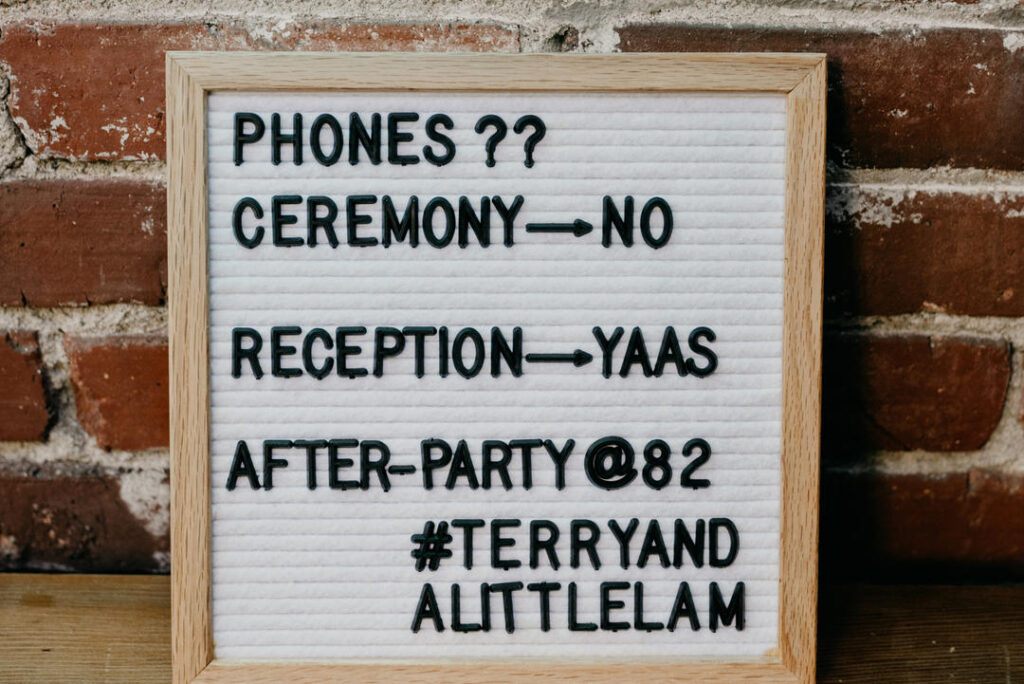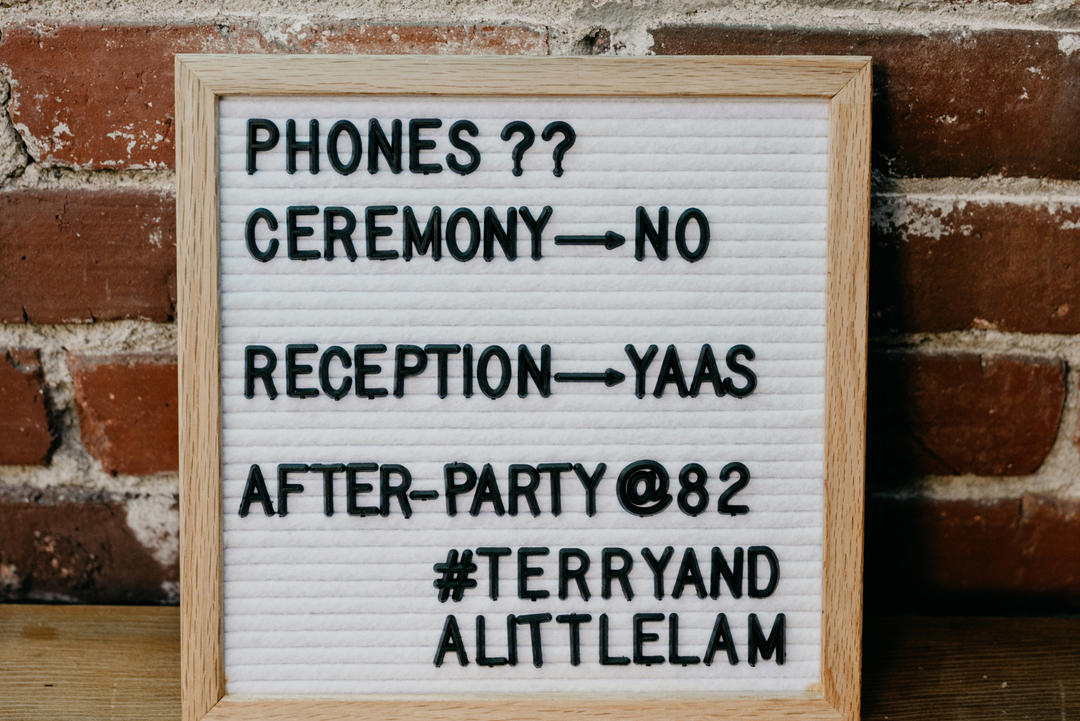As wedding officiants sometimes we are asked to make an announcement before the ceremony begins about it being an unplugged ceremony. Here is the wording I use with very positive results:
“Before we begin today’s ceremony, ___ and ___ invite you to be truly present at this time during the ceremony. Please turn off your cell phones and put down your cameras for an unplugged ceremony. ___ and ___ have hired an amazing photographer to capture this moment. But I encourage the rest of us to capture in our hearts the love between ___ and ___, without the distraction of technology. Thank you.”

Photo by Rachel Gulotta Photography
Here is a good article by Zola.com about this question.
In today’s tech-centric culture, there aren’t many opportunities to disconnect. So, for many couples, their wedding offers the perfect opportunity for them—and their guests—to truly unplug. Zola recently surveyed 500 couples on their upcoming nuptials and found that a whopping 80% planned to have an unplugged wedding. In some cases, that’s easier said than done. Read on for tips to creating a truly technology-free environment as you say “I do.”
What does “unplugged” really mean?
Unplugged can mean different things to different couples. Generally speaking, though, going fully unplugged is slightly different from a social media-free wedding. A social-media free wedding usually just means the couple has asked guests to refrain from posting pictures of their big day on the day-of.
A fully unplugged wedding means free of all technology: no cell phones, no cameras, no electronics, no social media.
Why are couples having unplugged weddings?
The couples we surveyed shared plenty of insights into why you might want to have an unplugged wedding. Here are some of the most popular reasons to go unplugged:
- Fear that a guest might ruin one of your professional photographer’s photos. For example, if your uncle decides to jump in the middle of the aisle to get a shot of the dress—and completely blocks your photographer’s shot in the process.
- Concerns that guest photos will be shared on social media before you get a chance to post your own photos.
- Ensure that guests are more connected and present—and aren’t checking their Instagram during the ceremony readings.
- Avoid any tech-related blunders (like someone’s cell phone going off while you’re reciting your wedding vows)
Basically, there are plenty of reasons to have an unplugged wedding. Don’t feel too concerned about why you want to go tech-free and focus on how you execute the policy.
How to Go Fully Unplugged
The key to success with throwing an unplugged wedding? Making sure that all your guests know your event is fully unplugged.
There are a few different strategies to loop your guests into your unplugged wedding (and make sure they stay unplugged!).
- Put it on the invite and wedding website. If you know you’re having an unplugged wedding far in advance, give your guests a heads up by including the information on your invites and wedding website. That way, guests know that your wedding is phone-, camera-, and social media-free—and they’ll have plenty of time to prepare themselves.
- Make it clear when electronics are or are not allowed. According to our survey, 90% of couples only plan to go fully unplugged for the ceremony, while just 5% of couples choose to have their entire wedding unplugged from beginning to end. Make sure you let your guests know when they need to stay unplugged—and if phones and electronics are ok to use after you say your “I do’s.”
- Include signage. Even if your guests know you’re having an unplugged wedding in advance, you want to make sure it’s clear the day of your wedding. The most common ways couples let their guests know about the phone and electronic-free protocol? Adding a note in the ceremony program and/or placing signs at the entrance to the ceremony. You can also have your officiant make an announcement before your ceremony gets underway as a last-minute reminder!
- Collect people’s electronics at the door. If you really want to ensure that no one is posting on social media or snapping pictures on their phones, you can collect your guests’ electronics at the door—and give them back once the ceremony or wedding is over. Just keep in mind that some guests might not be willing to part with their phones—and, for some guests, it might not even be possible. For example, parents who left their kids with a babysitter and need to be available in case of an emergency.
How To Enforce The Rules
Chances are, most of your guests will be fully on board with your unplugged wedding. However, there may be an outlier or two who have a real problem putting down their phones and being present (and electronic-free!) for your big event—and here are a few strategies for dealing with those guests:
- Delegate a friend or family member to do a “phone sweep.” If you’re concerned that some of your guests will ignore the unplugged rule during your ceremony, ask a friend or family member to walk around before the ceremony begins. If anyone has a phone or camera in hand, gently remind them that you’re having an unplugged wedding and ask them to put it away.
- Talk to your guests. If you happen to notice that someone is snapping photos or posting pictures online, talk to them. They’re probably just doing it out of habit. A gentle reminder from the couple could be all it takes to stash their phone and enjoy the day completely unplugged.
- Let it go. You’re probably going to be annoyed if people refuse to go unplugged at your wedding. Other than taking the phone or camera out of their hands (please don’t do this), you can’t really force them. Don’t let it ruin your wedding. Instead, let it go for the moment. Enjoy your night. If you’re really hurt by it, circle back after the wedding and let them know it upset you.
There aren’t a ton of opportunities to unplug these days, but we can’t think of a better reason to turn off your phone and enjoy the moment than your big day. So if your dream wedding is one that’s completely free of phones, electronics, and social media, take these tips and use them to plan the perfect unplugged wedding.
